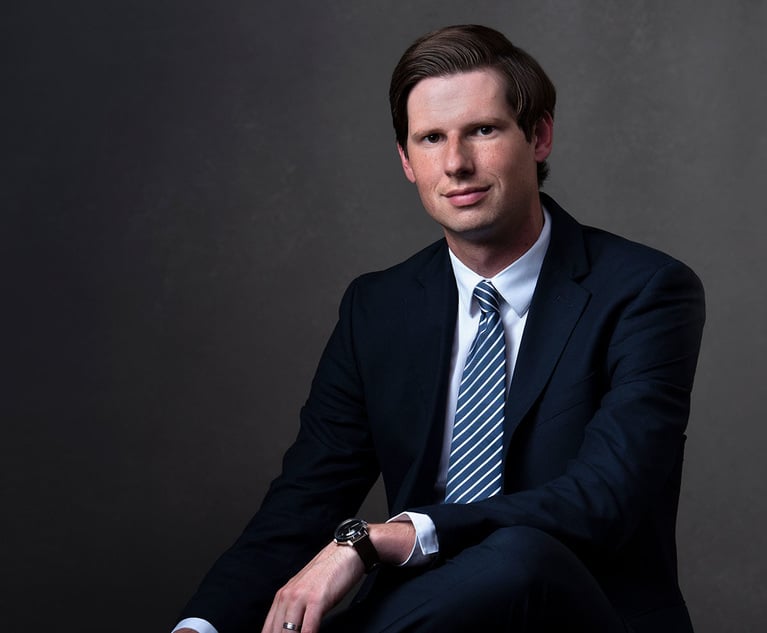Wolf Stresses Education, Job Skills in $34B Budget Proposal
Gov. Tom Wolf asked the General Assembly on Feb. 5 for hundreds of millions of dollars more for schools in his annual budget address, as well as a sprinkling of money for programs to improve worker training and aid the agricultural sector.
February 08, 2019 at 03:45 PM
4 minute read
 The Pennsylvania State Capitol Building, in downtown Harrisburg.
The Pennsylvania State Capitol Building, in downtown Harrisburg.
Gov. Tom Wolf asked the General Assembly on Feb. 5 for hundreds of millions of dollars more for schools in his annual budget address, as well as a sprinkling of money for programs to improve worker training and aid the agricultural sector.
Wolf said he is also seeking new tuition aid for community college students who remain in Pennsylvania.
Wolf, a Democrat, addressed a joint session of the Republican-controlled legislature.
Wolf said the most significant element of the $34.1 billion budget plan, his first since winning a second term, is its efforts to help Pennsylvanians compete in a changing economy by bolstering skills and education.
He called it “a plan to create a new generation of prosperity” by building the nation's strongest workforce.
“Our challenge demands an all-hands-on-deck approach,” Wolf told lawmakers in the 28-minute address. “And this budget proposal itself asks Pennsylvanians to come together—business leaders, educators, students, workers—to address the challenge of renewing our prosperity for another generation.”
Including nearly $500 million in supplemental cash for the current fiscal year, Wolf is seeking authorization for another $1.9 billion in new spending, or nearly 6 percent more.
The proposal would not increase the state's taxes on income and sales. But Wolf last week laid out a parallel plan to impose a severance tax on Marcellus Shale natural gas production to finance borrowing for a wide range of projects, from economic development to environmental cleanups.
Wolf's first term was marked by long, drawn-out budget fights with Republican lawmakers. The new proposal is modest in comparison to his earliest plans, which carried multibillion-dollar tax increases, and appears to reflect Wolf's shift in strategy to the realities of negotiating with big Republican majorities.
Top Republicans reacted relatively warmly to Wolf's proposal, applauding its lack of a tax increase and its focus on workforce development.
However, Senate President Pro Tempore Joe Scarnati, R-Jefferson, warned that tax collections aren't keeping up with spending growth, even during a strong economy, and suggested that spending must be reined in.
Sen. Vincent Hughes, D-Philadelphia, the ranking Democrat on the Appropriations Committee, said fellow Democrats were already grumbling that Wolf is not seeking more money for public schools.
The extra spending in Wolf's plan would largely go toward public schools, prisons, pension obligations and health care for the poor. The administration said the plan carries a half-billion dollars in new initiatives.
To help fund it, Wolf's administration is counting on tax collections to rise by a solid 3 percent, plus hundreds of millions of dollars from surplus money already appropriated, higher assessments on Medicaid providers and a fee on municipalities that rely only on state troopers to provide police coverage.
Pennsylvania's tax collections are perhaps in their best shape since the recession a decade ago. But the state is facing challenges, including rising borrowing costs, a ballooning retirement-age population and a static working-age population.
Most of the new money in Wolf's budget would go to public schools, including $200 million for general operations and instruction. About $13 million of that would finance a boost in the state's decades-old minimum wage for teachers from $18,500 to $45,000, a provision officials said would mostly benefit rural school districts.
Schools also would get another $45 million for school safety, a higher priority after last February's school shooting in Parkland, Florida, while the state would borrow more money for school construction projects.
To try to reverse the loss of younger people moving to other states, Wolf is seeking $8 million to give community college students who remain in Pennsylvania a $2,500 grant to offset tuition or pay down student debt. To enhance skills training, Wolf is seeking $12 million in grants for employers to train workers and $10 million more to encourage apprenticeships.
The state's large agricultural sector also gets attention from Wolf's budget plan in an effort to boost its long-term prospects. That includes millions of dollars to aid business development, increase processing capacity, draw more workers and market organic products.
This content has been archived. It is available through our partners, LexisNexis® and Bloomberg Law.
To view this content, please continue to their sites.
Not a Lexis Subscriber?
Subscribe Now
Not a Bloomberg Law Subscriber?
Subscribe Now
NOT FOR REPRINT
© 2025 ALM Global, LLC, All Rights Reserved. Request academic re-use from www.copyright.com. All other uses, submit a request to [email protected]. For more information visit Asset & Logo Licensing.
You Might Like
View All
People in the News—Jan. 23, 2025—Marshall Dennehey, Duane Morris, Hangley Aronchick
3 minute read
Plaintiff Argues Jury's $22M Punitive Damages Finding Undermines J&J's Talc Trial Win
4 minute read
Pa. High Court: Concrete Proof Not Needed to Weigh Grounds for Preliminary Injunction Order
4 minute read
Trending Stories
- 1Who Are the Judges Assigned to Challenges to Trump’s Birthright Citizenship Order?
- 2Litigators of the Week: A Directed Verdict Win for Cisco in a West Texas Patent Case
- 3Litigator of the Week Runners-Up and Shout-Outs
- 4Womble Bond Becomes First Firm in UK to Roll Out AI Tool Firmwide
- 5Will a Market Dominated by Small- to Mid-Cap Deals Give Rise to a Dark Horse US Firm in China?
Who Got The Work
J. Brugh Lower of Gibbons has entered an appearance for industrial equipment supplier Devco Corporation in a pending trademark infringement lawsuit. The suit, accusing the defendant of selling knock-off Graco products, was filed Dec. 18 in New Jersey District Court by Rivkin Radler on behalf of Graco Inc. and Graco Minnesota. The case, assigned to U.S. District Judge Zahid N. Quraishi, is 3:24-cv-11294, Graco Inc. et al v. Devco Corporation.
Who Got The Work
Rebecca Maller-Stein and Kent A. Yalowitz of Arnold & Porter Kaye Scholer have entered their appearances for Hanaco Venture Capital and its executives, Lior Prosor and David Frankel, in a pending securities lawsuit. The action, filed on Dec. 24 in New York Southern District Court by Zell, Aron & Co. on behalf of Goldeneye Advisors, accuses the defendants of negligently and fraudulently managing the plaintiff's $1 million investment. The case, assigned to U.S. District Judge Vernon S. Broderick, is 1:24-cv-09918, Goldeneye Advisors, LLC v. Hanaco Venture Capital, Ltd. et al.
Who Got The Work
Attorneys from A&O Shearman has stepped in as defense counsel for Toronto-Dominion Bank and other defendants in a pending securities class action. The suit, filed Dec. 11 in New York Southern District Court by Bleichmar Fonti & Auld, accuses the defendants of concealing the bank's 'pervasive' deficiencies in regards to its compliance with the Bank Secrecy Act and the quality of its anti-money laundering controls. The case, assigned to U.S. District Judge Arun Subramanian, is 1:24-cv-09445, Gonzalez v. The Toronto-Dominion Bank et al.
Who Got The Work
Crown Castle International, a Pennsylvania company providing shared communications infrastructure, has turned to Luke D. Wolf of Gordon Rees Scully Mansukhani to fend off a pending breach-of-contract lawsuit. The court action, filed Nov. 25 in Michigan Eastern District Court by Hooper Hathaway PC on behalf of The Town Residences LLC, accuses Crown Castle of failing to transfer approximately $30,000 in utility payments from T-Mobile in breach of a roof-top lease and assignment agreement. The case, assigned to U.S. District Judge Susan K. Declercq, is 2:24-cv-13131, The Town Residences LLC v. T-Mobile US, Inc. et al.
Who Got The Work
Wilfred P. Coronato and Daniel M. Schwartz of McCarter & English have stepped in as defense counsel to Electrolux Home Products Inc. in a pending product liability lawsuit. The court action, filed Nov. 26 in New York Eastern District Court by Poulos Lopiccolo PC and Nagel Rice LLP on behalf of David Stern, alleges that the defendant's refrigerators’ drawers and shelving repeatedly break and fall apart within months after purchase. The case, assigned to U.S. District Judge Joan M. Azrack, is 2:24-cv-08204, Stern v. Electrolux Home Products, Inc.
Featured Firms
Law Offices of Gary Martin Hays & Associates, P.C.
(470) 294-1674
Law Offices of Mark E. Salomone
(857) 444-6468
Smith & Hassler
(713) 739-1250





